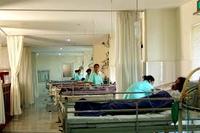
Luís A. Nunes Amaral
Professor of Engineering Sciences and Applied Mathematics
Professor of Medicine (by courtesy)
Professor of Molecular Biosciences (by courtesy)
Professor of Physics & Astronomy (by courtesy)
Engineering Sciences and Applied Mathematics
2145 Sheridan Road (Room M426)
Evanston, IL 60208, US
Phone:
+1 847-491-7850

Prompting physicians to address a daily checklist and process of care and clinical outcomes: A single-site study
American Journal of Respiratory and Critical Care Medicine 184, 680-686 (2011)
Times cited: 58
Abstract
Rationale: Checklists may reduce errors of omission for critically ill patients. Objective: To determine whether prompting to use a checklist improves process of care and clinical outcomes.
Methods: We conducted a cohort study in the medical intensive care unit (MICU) of a tertiary care university hospital. Patients admitted to either of two independent MICU teams were included. Intervention team physicians were prompted to address six parameters from a daily rounding checklist if overlooked during morning work rounds. The second team (control) used the identical checklist without prompting.
Measurements and Main Results: 140 prompted group patients were compared to 125 control and 1,283 pre-intervention patients. Compared to control, prompting increased median ventilator-free duration, decreased empirical antibiotic and central venous catheter duration, and increased rates of DVT and stress ulcer prophylaxis. Prompted group patients had lower risk-adjusted ICU mortality compared to the control group (OR 0.36, 95% CI 0.13-0.96, P=0.041), and lower hospital mortality compared to the control group (10.0% vs. 20.8%, P=0.014), which remained significant after risk adjustment (odds ratio 0.34, 95% CI, 0.15-0.76, P=0.008). Observed-to-predicted ICU length of stay was lower in the prompted group compared to control (0.59 vs. 0.87, P=0.02). Checklist availability alone did not improve mortality or LOS compared to pre- intervention patients.
Conclusions: In this single-site, preliminary study, checklist-based prompting improved multiple processes of care, and may have improved mortality and length of stay, compared to a stand-alone checklist. The manner in which checklists are implemented is of great consequence in the care of critically ill patients.